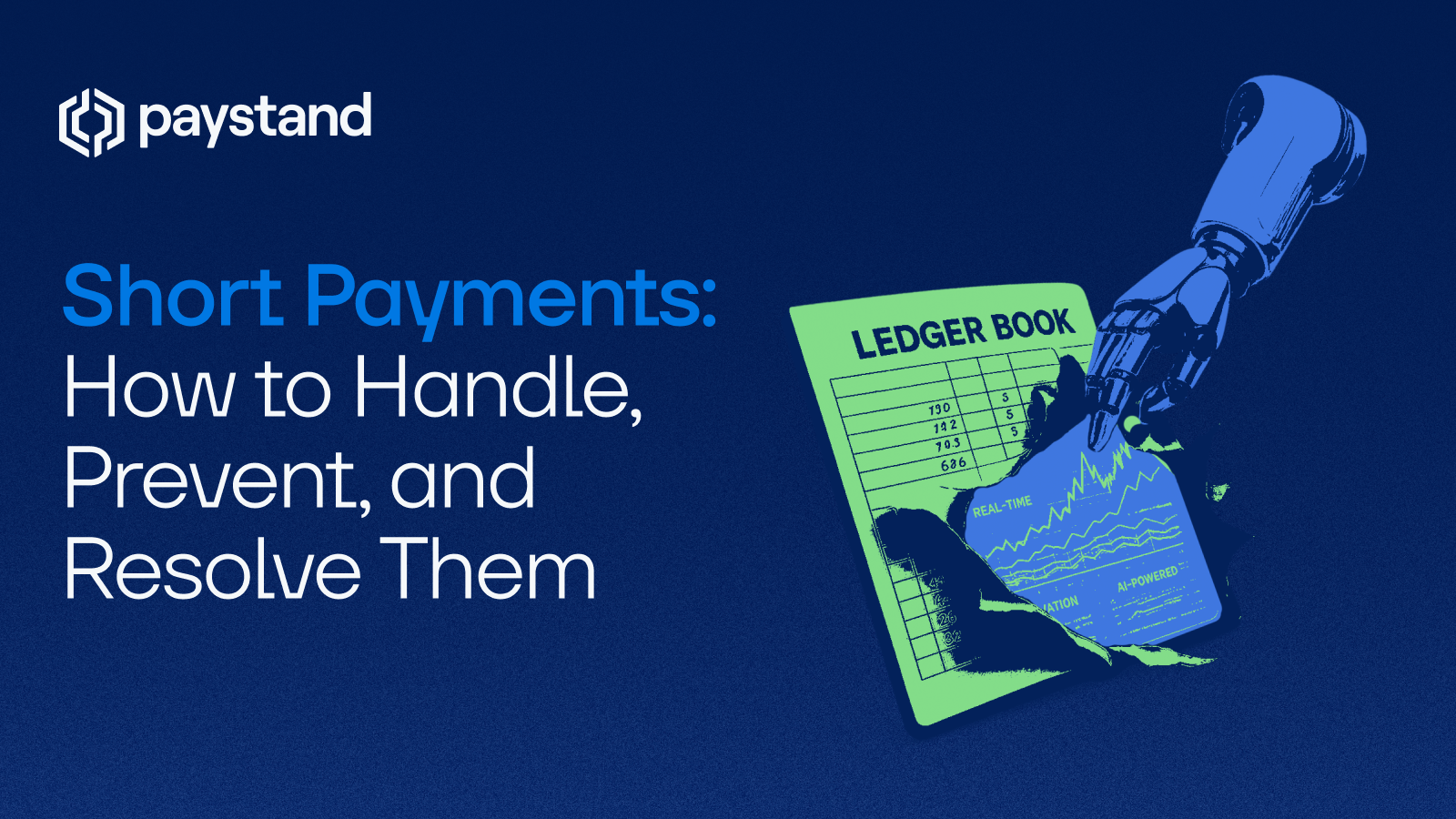Short Payments: How to Handle, Prevent, and Resolve Them

Table of Contents
- What Are Short Payments?
- Why Do Short Payments Occur?
- How Short Payments Affect Cash Flow
- Best Software to Automate and Manage Short Payments
- Recovering Outstanding Short Payments in B2B
- Top Strategies to Prevent Short Payments
- Accounting Solutions to Track and Resolve Short Payments
Key Takeaways
- Short payments—when customers underpay invoices—are more than just an accounting nuisance. They disrupt cash flow, create time-consuming manual reconciliation, and frustrate the accounts receivable team.
- Common causes include misapplied early payment discounts, unclear payment terms, and human error.
- The best way to resolve short payments is with automation that streamlines reconciliation and accelerates dispute resolution.
- Strategies like accurate invoicing, strong customer payment experiences, and advanced payment processing help prevent short payments before they begin.
- Finance teams that adopt automation improve their ability to manage underpayments while strengthening customer relationships.
What Are Short Payments?
A short payment happens when a customer pays less than the total invoiced amount on a bill. Unlike late payments, which delay revenue recognition, short payments reduce the expected funds you collect even when the invoice is technically “paid.” This can create serious issues in accounts receivable because your AR team is left reconciling discrepancies, issuing credits, or chasing down the missing balance.
Understanding short payments also requires looking at the bigger picture of accounts receivable vs. accounts payable, since these two functions are interconnected. When receivables fall short, it often impacts how your organization meets its payables obligations.
Why Do Short Payments Occur?
There are several reasons short payments occur, ranging from simple human error to deliberate tactics. Common causes include:
- Customers incorrectly applying early payment discounts.
- Deductions for damaged goods, shipping costs, or disputed services.
- Misinterpretation of payment terms, especially if they are vague or inconsistent.
- A customer pays less than the total amount intentionally to buy extra time before settling the full balance.
These situations increase Days Sales Outstanding (DSO), forcing finance teams to spend more time chasing down missing funds. Companies looking to improve collections should focus on strategies to reduce DSO, since longer payment cycles make short pays more frequent and disruptive.
How Short Payments Affect Cash Flow
Even small underpayments are not harmless. When partial payments accumulate across dozens or hundreds of customers, your cash flow suffers. The accounts receivable team ends up spending hours in time-consuming reconciliations, trying to identify whether the discrepancy was a manual process error, a misapplied discount, or an unexpected short deduction.
Ultimately, short payments don’t just create administrative headaches—they also ripple through your ability to pay vendors, reinvest in operations, and maintain strong financial health. That’s why many companies are modernizing their payment processing systems to spot short pays earlier and address them proactively.
What Is the Best Software to Automate and Manage Short Payments to Improve Cash Flow?
The best way to handle short payments is to automate the process. Instead of relying on spreadsheets or emails, modern accounts receivable automation software can:
- Flag discrepancies as soon as a short pay an invoice is recorded.
- Reconcile invoices automatically against discounts or approved deductions.
- Escalate cases to your AR staff when a dispute resolution workflow is needed.
Companies that embrace accounts receivable automation not only save their teams from manual reconciliation but also gain real-time visibility into payment trends. By streamlining collections, they prevent revenue leakage and accelerate cash inflows.
How Can I Recover Outstanding Short Payments from Customers in a B2B Environment?
Recovering outstanding short payments requires speed and transparency. First, businesses should identify the root cause and then communicate with the customer before tensions escalate. Digital invoicing practices, such as clearly documenting payment terms, make a huge difference. For instance, applying digital invoice best practices ensures customers know exactly what’s owed and when.
If short payments continue, organizations may need to escalate through a structured payment dispute process. However, proactive engagement paired with automation can often resolve issues before they reach that point.
What Are the Top Strategies or Services to Prevent Short Payments in Invoice Processing?
The most effective way to prevent short payments is to eliminate ambiguity and friction in the invoicing process. Some top strategies include:
- Issuing invoices that apply early payment discounts consistently and accurately.
- Leveraging payment automation to reduce manual processes and the time-consuming errors that follow.
- Delivering a seamless customer payment experience so buyers clearly see amounts due and payment options.
- Monitoring recurring short-pay behavior to flag problem accounts early.
When companies strengthen invoicing transparency and minimize manual intervention, customers have fewer opportunities to underpay—whether intentionally or by mistake. This is where payment automation becomes a competitive advantage.
Which Accounting Solutions Help Companies Track and Resolve Short Payments from Clients Efficiently?
Modern accounting solutions make it easier to track and resolve short payments by connecting invoicing, payment reconciliation, and AR workflows. These platforms:
- Highlight discrepancies between invoiced amounts and partial payments.
- Route unresolved balances to the appropriate accounts receivable team member.
- Integrate dispute resolution functionality when customer disagreements arise.
- Provide reporting tools that help leaders forecast and optimize cash flow.
Beyond short payments, finance teams that embrace automation benefit across the board. In fact, companies that adopt modern solutions see why finance automation is good for your job; it reduces tedious work, creates clarity, and improves efficiency.
Want to eliminate the hassle of chasing short pays and strengthen collections? Learn how Paystand’s Collections Automation solution can help.







%20(1)%20(1).jpg?width=100&height=100&name=IMG_3752%20(1)%20(1)%20(1).jpg)